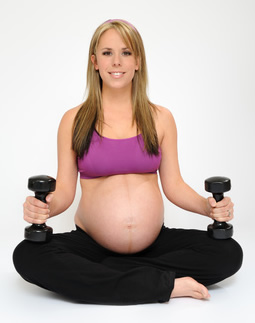
The fitter and stronger you are throughout your pregnancy, the more easily your body will adapt to the changes that pregnancy will bring. Exercising will also help you to cope with labour, and will help you to get back into shape after your pregnancy.
Another benefit of exercise throughout pregnancy is the way that it can make you feel – exercise releases endorphins, which will make you feel better, and you’ll also feel more in control of your body.
Exercise can also help reduce constipation, relieve backache and other aches and pains, prevent wear and tear on your joints and muscles and help you sleep better.
What type of exercise should you do?
The only difference when exercising through your pregnancy is that you’re not looking to tire yourself out. Exercise should be moderate, and you shouldn’t be doing overly vigorous exercise like running, jogging or cycling for long distances or horse-riding, but apart from that, you can exercise as normal for as long as you feel comfortable or for as long as your doctor or midwife tells you that it’s okay.
As a general rule, whenever you exercise throughout pregnancy you should be able to hold a conversation – if you are too breathless to talk, you are exercising too strenuously. If you weren’t active before your pregnancy, it’s not a good idea to just jump into a strenuous exercise routine – you should start at 15 minutes, 3 times a week, moving to a maximum of 30 minutes, 4 times a week. Even just keeping active by going for a gentle walk every day is better than getting no exercise.
If you go to an exercise class throughout your pregnancy, make sure your instructor is qualified and that they know you’re pregnant. Swimming is also an excellent exercise to do whilst pregnant, as the water helps to support your extra weight – try looking for a local pool that runs aqua-natal classes, as these are specifically targeted to pregnant women.
Yoga and Pilates are also good choices, as they are gentle exercises that strengthen your core – and the good thing about both yoga and Pilates are that you can make them easier on your body or more difficult, so throughout pregnancy you can lower the intensity of the exercises so that they are easier on your body.
You can also do gentle aerobic exercises throughout pregnancy, such as dance class, aerobics, step aerobics and sports. These exercises are all relatively gentle and will keep your heart rate up, which will help to keep you fit and strong throughout your pregnancy.
Exercises to avoid include contact sports, jogging, running, cycling, ice hockey and gymnastics – these exercises could cause you to be hit or to fall down, so you should steer clear of them throughout your pregnancy. If you do exercise such as Pilates, you should steer clear of movements that require you to lie flat on your back after 16 weeks – this movement will put too much pressure on your large blood vessels, due to the weight of your bump which could cause complications and also make you feel faint and weak.
Stomach strengthening exercises are always a good choice throughout pregnancy – they will stop you from getting backache and will also help to keep your tummy muscles strong, which will help your stomach to ping back into shape after pregnancy. Kneel on all fours, with knees under hips and hands under shoulders. Your back should be straight. Pull in your stomach muscles and raise your back towards the ceiling, curling your bottom downwards. Hold for a few seconds and then repeat ten times. Move carefully and only move as far as you are able to whilst still feeling comfortable. Pelvic floor exercises are also vital throughout pregnancy – see why here
The most important thing to remember throughout your pregnancy is to keep things slow and steady, not to over-exert yourself and not to do anything that makes you feel uncomfortable. Listen to your body and if you feel like you need to rest, rest!
And click here for some advice on how to eat a healthy diet in pregnancy
